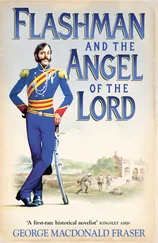"Sephardi," Rabbi Shulevitz murmured. "Of course he'd be Sephardi."
Aunt Rifke said, "You can see through him. Right through."
In fact he seemed to come and go: near-solid one moment, cobweb and smoke the next. His face was lean and dark, and must have been a proud face once. Now it was just weary, unspeakably weary — even a ten-year-old could see that. The lines down his cheeks and around the eyes and mouth made me think of desert pictures I'd seen, where the earth gets so dry that it pulls apart, cracks and pulls away from itself. He looked like that.
But he smiled at me. No, he smiled into me, and just as I've never seen eyes like his again, I've never seen a smile as beautiful. Maybe it couldn't reach his eyes, but it must have reached mine, because I can still see it. He said softly, "Thank you. You are a kind boy. I promise you, I will not take up much room."
I braced myself. The only invasive procedures I'd had any experience with then were my twice-monthly allergy shots and the time our doctor had to lance an infected finger that had swollen to twice its size. Would possession be anything like that? Would it make a difference if you were sort of inviting the possession, not being ambushed and taken over, like in Invasion of the Body Snatchers? I didn't mean to close my eyes, but I did.
Then I heard the voice of the blue angel.
"There is no need." It sounded like the voice I knew, but the breath in it was different — I don't know how else to put it. I could say it sounded stronger, or clearer, or maybe more musical; but it was the breath, the free breath. Or maybe that isn't right either, I can't tell you — I'm not even certain whether angels breathe, and I knew an angel once. There it is.
"Manassa, there is no need," she said again. I turned to look at her then, when she called the dybbuk by his name, and she was smiling herself, for the first time. It wasn't like his; it was a faraway smile at something I couldn't see, but it was real, and I heard Uncle Chaim catch his breath. To no one in particular, he said, " Now she smiles. Never once, I could never once get her to smile."
"Listen," the blue angel said. I didn't hear anything but my uncle grumbling, and Rabbi Shulevitz's continued Hebrew prayers. But the dybbuk— Manassa — lifted his head, and the endlessly black eyes widened, just a little.
The angel said again, "Listen," and this time I did hear something, and so did everyone else. It was music, definitely music, but too faint with distance for me to make anything out of it. But Aunt Rifke, who loved more kinds of music than you'd think, put her hand to her mouth and whispered, " Oh. "
"Manassa, listen," the angel said for the third time, and the two of them looked at each other as the music grew stronger and clearer. I can't describe it properly: it wasn't harps and psalteries — whatever a psaltery is, maybe you use it singing psalms — and it wasn't a choir of soaring heavenly voices, either. It was almost a little scary, the way you feel when you hear the wild geese passing over in the autumn night. It made me think of that poem of Tennyson's, with that line about the horns of Elfland faintly blowing. We'd been studying it in school.
"It is your welcome, Manassa," the blue angel said. "The gates are open for you. They were always open."
But the dybbuk backed away, suddenly whimpering. "I cannot! I am afraid! They will see!"
The angel took his hand. "They see now, as they saw you then. Come with me, I will take you there."
The dybbuk looked around, just this side of panicking. He even tugged a bit at the blue angel's hand, but she would not let him go. Finally he sighed very deeply — lord, you could feel the dust of the tombs in that sigh, and the wind between the stars — and nodded to her. He said, "I will go with you."
The blue angel turned to look at all of us, but mostly at Uncle Chaim. She said to him, "You are a better painter than I was a muse. And you taught me a great deal about other things than painting. I will tell Rembrandt."
Aunt Rifke said, a little hesitantly, "I was maybe rude. I'm sorry." The angel smiled at her.
Rabbi Shulevitz said, "Only when I saw you did I realize that I had never believed in angels."
"Continue not to," the angel replied. "We rather prefer it, to tell you the truth. We work better that way."
Then she and the dybbuk both looked at me, and I didn't feel even ten years old; more like four or so. I threw my arms around Aunt Rifke and buried my face in her skirt. She patted my head — at least I guess it was her, I didn't actually see her. I heard the blue angel say in Yiddish, " Sei gesund, Chaim's Duvidl. You were always courteous to me. Be well."
I looked up in time to meet the old, old eyes of the dybbuk. He said, "In a thousand years, no one has ever offered me freely what you did." He said something else, too, but it wasn't in either Hebrew or Yiddish, and I didn't understand.
The blue angel spread her splendid, shimmering wings one last time, filling the studio — as, for a moment, the mean winter sky outside seemed to flare with a sunset hope that could not have been. Then she and Manassa, the dybbuk, were gone, vanished instantly, which makes me think that the wings aren't really for flying. I don't know what other purpose they could serve, except they did seem somehow to enfold us all and hold us close. But maybe they're just really decorative. I'll never know now.
Uncle Chaim blew out his breath in one long, exasperated sigh. He said to Aunt Rifke, "I never did get her right. You know that."
I was trying to hear the music, but Aunt Rifke was busy hugging me, and kissing me all over my face, and telling me not ever, ever to do such a thing again, what was I thinking? But she smiled up at Uncle Chaim and answered him, "Well, she got you right, that's what matters." Uncle Chaim blinked at her. Aunt Rifke said, "She's probably telling Rembrandt about you right now. Maybe Vermeer, too."
"You think so?" Uncle Chaim looked doubtful at first, but then he shrugged and began to smile himself. "Could be."
I asked Rabbi Shulevitz, "He said something to me, the dybbuk, just at the end. I didn't understand."
The rabbi put his arm around me. "He was speaking in old Ladino, the language of the Sephardim. He said, 'I will not forget you .'" His smile was a little shaky, and I could feel him trembling himself, with everything over. "I think you have a friend in heaven, David. Extraordinary Duvidl."
The music was gone. We stood together in the studio, and although there were four of us, it felt as empty as the winter street beyond the window where the blue angel had posed so often. A taxi took the corner too fast, and almost hit a truck; a cloud bank was pearly with the moon's muffled light. A group of young women crossed the street, singing. I could feel everyone wanting to move away, but nobody did, and nobody spoke, until Uncle Chaim finally said, "Rabbi, you got time for a sitting tomorrow? Don't wear that suit."











